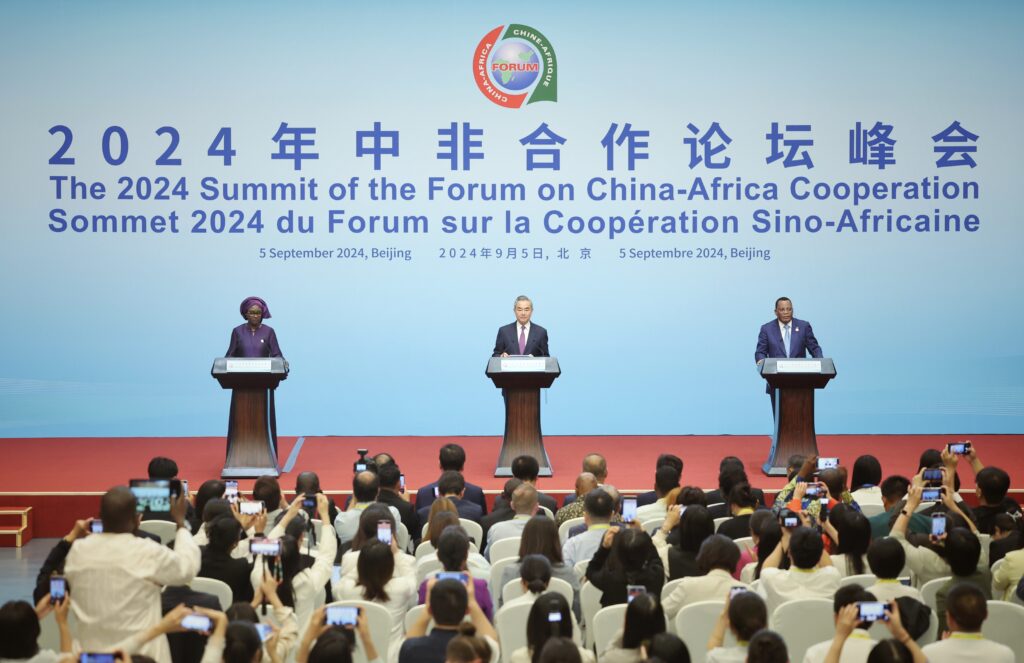Entretiens / Africa/s
24 September 2024
Focac 2024: Economic Caution and Asymmetrical Partnership Between China and Africa

The Forum on China-Africa Cooperation (FOCAC) was held in Beijing from 4 to 6 September. It brought together nearly 50 African leaders around Xi Jinping, who presented his vision of cooperation between China and the continent and made promises of increased financial commitments compared to the last summit in 2021. Against a backdrop of slowing Chinese growth and a significant reduction in Chinese funding for Africa, what are the economic issues at stake at FOCAC 2024? What are the trade and financial exchanges between China and Africa like? What announcements were made at the summit? What are the expectations and prospects for African countries in their economic collaboration with China? An update from Émilie Laffiteau, macroeconomist and associate researcher at IRIS.
What are the main features of economic exchanges between China and Africa?
Sub-Saharan Africa’s economic situation is significantly dependent on China’s, and this has become even more true over the last twenty years. According to a study by the International Monetary Fund (IMF) in 2023, a one-point drop in China’s growth rate will reduce African growth by around 0.25. For oil-exporting countries such as Angola and Nigeria, the loss is twice as high.
In terms of trade, the relationship is characterised by asymmetrical trade, and this has not changed. Goods exported by China remain manufactured goods and capital goods, while goods exported by Africa remain essentially raw minerals and agricultural products. Moreover, China is currently Africa’s main trading partner, accounting for a fifth of its total trade (figures from the United Nations Conference on Trade and Development (UNCTAD)), whereas the African continent accounts for only around 4% of China’s trade. Furthermore, bilateral trade balances on the African side are all in deficit (with the exception of South Africa), and these deficits are widening year on year (at regional level, they are set to rise from $47 billion in 2022 to $63 billion in 2023). Finally, almost half of Sino-African trade is concentrated in five countries: South Africa, Angola, the Democratic Republic of Congo, Egypt and Ghana.
In financial terms, China’s share of creditors has risen steadily, from 2% in 2005 to 17% in 2021 (IMF figures). On a bilateral level, China holds around 60% of the debt of African countries, making it the continent’s leading investor. However, this observation needs to be qualified, as Beijing has little or no involvement in multilateral financing, which accounts for a significant proportion of financial flows to Africa, particularly sovereign debt: China holds just 6% of sovereign debt claims. During the 2010s, Chinese funding to Africa grew steadily, particularly as it accompanied the deployment of Xi Jinping’s ambitious ‘New Silk Roads’ project. It peaked in 2016 at $30 billion, but has since fallen sharply, to less than $5 billion by 2023. In recent years, Chinese creditors have been more cautious, in the wake of Covid-19, the slowdown in Chinese growth and the difficulty African countries have in honouring their debt service (Kenya owes China more than $8 billion). Many projects have been judged by Beijing to have been poorly thought out or not optimised. For example, some port projects have been suspended, such as Bagamoyo in Tanzania in 2019 and Conakry in Guinea, which was finally transferred to a Turkish group in 2018. China has thus scaled back its financing activities in Africa, revising its ambitions downwards, refocusing its activities on energy and digital technology and giving priority to financing smaller-scale projects.
Finally, the share of foreign direct investment in Africa in total financial flows remains very low, preventing any significant industrial development through technology transfers. Chinese loans to build infrastructure are undeniably beneficial to African economies, but there is very little Chinese investment to really develop local territories and skills.
What announcements were made at the last FOCAC?
FOCAC brought together nearly 50 African leaders around Xi Jinping in Beijing from 4 to 6 September 2024. This triennial summit was an opportunity for China to reaffirm its commitment to Africa and beyond, to the global South, through pledges of investment, partnerships and lines of credit. At first sight, the commitment of 50 African countries at the summit, facing China alone, could put the continent in a favourable negotiating position. But African states often have divergent, even competing, interests. They are not in control of the Summit agenda set by Beijing and – unlike China – do not operate with a set of coherent strategic objectives over a long period. Individual sovereignty is preferred to a joint approach, which does not allow for more balanced bilateral collaboration.
Beijing has pledged $50 billion over the next three years, including $29 billion in loans, $11 billion in aid and $10 billion in investment. This represents an additional $10 billion compared to the 2021 summit, marking a significant effort on China’s part vis-à-vis the continent. This amount can also be compared with that of the United States, which pledged $55 billion in 2022. It is reasonable to assume that China is aligning itself with Washington. However, if we compare these figures with those for the 2010 decade, the ambitions have clearly been scaled back to ‘small but beautiful’ projects, in the words of the Chinese leader. Furthermore, these figures should be analysed with great caution, as commitments are not tracked and it is impossible to check whether the sums promised have actually been committed or disbursed.
The main announcements continue to focus on infrastructure and trade. New investment projects are also focusing on solar energy (solar panels, batteries), to promote the energy transition and greater autonomy for the continent. Here again, however, these projects may be seen as unbalanced in terms of their impact, since the panels or batteries will be built in China, making it impossible in the short term to reduce the continent’s trade deficit or to transfer technology or skills.
So although there were many calls for closer cooperation in a win-win spirit at FOCAC 2024, some African leaders, such as South African President Cyril Ramaphosa, called for a change in the structure of trade, calling for more stable investments that would generate jobs on the continent.
What are the expectations and prospects for African countries in terms of trade with China?
African countries have a wide range of expectations, some of which are difficult to understand, and their strategic objectives may differ. In this respect, the role of the African Union (AU) is regularly questioned. The AU represents a strategic tool for the continent, particularly on economic issues, and should therefore enable African states to better converge their cooperation strategies and consolidate their positions within the global balance. However, the institution’s results in this area have so far been disappointing.
However, some of the needs of African economies are converging. One major challenge lies in positioning Africa within value chains. In Sino-African trade, processing, jobs and technologies remain in China, and even if Xi Jinping has promised a million jobs for the continent in the future, Beijing has every interest in maintaining the status quo so as not to participate in the emergence of new competitors. Another issue is the abolition of customs duties on the Chinese side. Some announcements have been made here, but the impact appears to be virtually nil. Finally, the question of debt is crucial. Africa’s debt service to China is exploding in a global context of high interest rates. Arrears are piling up and the risk of default is high.
From China’s point of view, the stakes remain much the same: Africa is seen as a major source of supply for minerals, fuels and agricultural products, as well as an outlet for its low-cost processed products. Land acquisition is also an objective for Beijing, although some would argue that this is a land grab. However, while securing raw materials remains a priority for China, the deteriorating security situation on the continent suggests that Beijing is likely to intervene more significantly in this area. On this point, the recent establishment of China’s first military base outside its own territory in Djibouti could be seen as the beginning of a deployment on the continent.
Against this backdrop, the only significant economic lever that seems likely to work in favour of the Africans in establishing more balanced trade relations is the strong demand for minerals to support the development of renewable energies. And this applies not only to Africa’s cooperation with China, but also with the rest of the world.
Translated by Deepl

